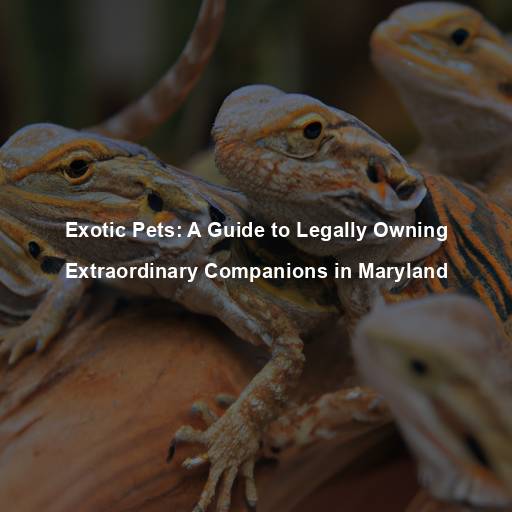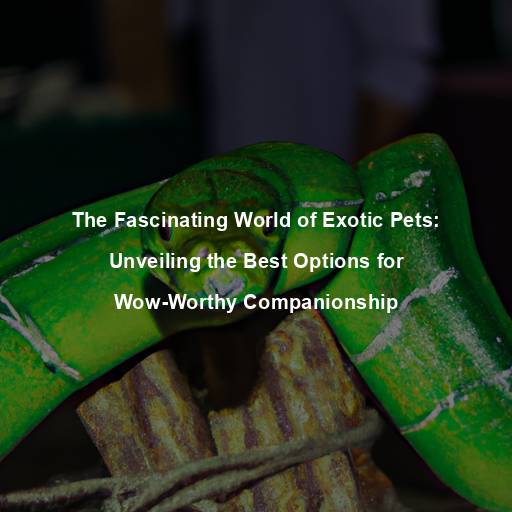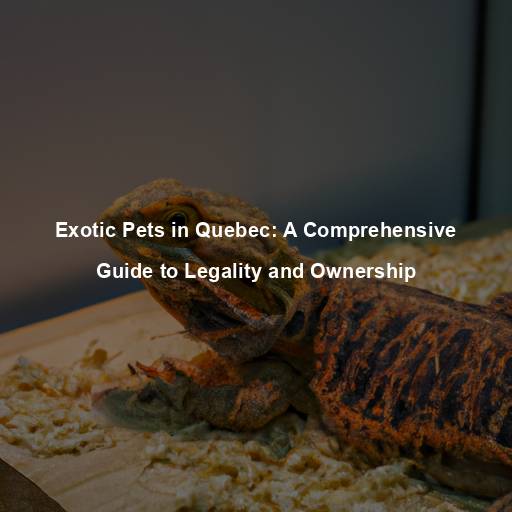States Where Exotic Pets are Legal: A Comprehensive Guide
Last Updated on August 7, 2023 by Evan
Contents [hide]
- 1 Understanding the Legal Landscape of Exotic Pets
- 2 States Where Exotic Pets are Legal
- 3 Responsible Exotic Pet Ownership
- 3.1 Extensive Research and Education
- 3.2 Consultation with Experts
- 3.3 Ethical Acquisition
- 3.4 Health and Veterinary Care
- 3.5 Secure and Enriching Environment
- 3.6 The Fascinating World of Exotic Pets
- 3.7 The Ethical Debate: Balancing Conservation and Ownership
- 3.8 The Role of Regulations: Striking a Balance
- 3.9 Licensing and Permitting: Safeguarding Exotic Pet Welfare
- 3.10 Education and Outreach: Fostering Responsible Ownership
- 3.11 Collaboration and Enforcement: Ensuring Compliance
- 3.12 The Importance of Responsible Ownership
- 3.13 Celebrating the Beauty of Exotic Pets
- 4 FAQs: States Where Exotic Pets Are Legal
- 4.1 Are exotic pets legal in all states of the United States?
- 4.2 How can I find out if exotic pets are legal in my state?
- 4.3 Are there any states where owning exotic pets is completely prohibited?
- 4.4 What are some states where owning exotic pets is more lenient?
- 4.5 Are there any common exotic pets that are legal in most states?
- 4.6 Do state laws change regarding exotic pet ownership?
- 4.7 What happens if I own an exotic pet in a state where it is illegal?
- 4.8 Can I own an exotic pet if I obtain the necessary permits and licenses?
- 4.9 Are there any federal laws that govern exotic pet ownership?
- 4.10 Can I transport my exotic pet across state lines?
Understanding the Legal Landscape of Exotic Pets
For centuries, people have been captivated by the allure of exotic pets. From magnificent big cats to peculiar reptiles, these extraordinary creatures have never failed to spark curiosity and wonder. Yet, before delving into the realm of becoming a proud owner of an exotic pet, it is pivotal to unravel the perplexing web of laws and regulations that surround their ownership. Across the United States, each state dances to its own beat, implementing a unique set of rules when it comes to these enigmatic creatures.
The Appeal of Exotic Pets
There’s something undeniably captivating about exotic pets; their striking appearances and captivating behaviors make them irresistible to animal lovers far and wide. From the vibrant plumage of tropical birds to the sleek grace of slithering snakes, these creatures possess an otherworldly allure that sparks a sense of wonder and fascination. Owning an exotic pet is like embarking on a journey of discovery, offering a unique opportunity to form deep connections and learn about diverse species from around the globe. However, it’s important to approach this type of ownership with great responsibility, ensuring the welfare of these extraordinary animals and their devoted caretakers.
The legal landscape surrounding exotic pet ownership can be complex and varies significantly from state to state. While some states have stringent regulations, others have more lenient laws that permit ownership of a wide range of exotic animals. It is essential to familiarize oneself with the specific laws of the state in question to ensure compliance and avoid legal complications. Let’s explore some of the states where exotic pets are legal and the specific regulations that govern them.
States Where Exotic Pets are Legal
Florida: The Sunshine State’s Exotic Pet Haven
Florida, a place teeming with vibrant ecosystems and fascinating wildlife, has garnered a reputation for its involvement in the realm of exotic pet ownership. The state’s permissive laws grant individuals the opportunity to embrace a myriad of species within their homes. Nevertheless, amidst this captivating tapestry, it is crucial to navigate the complexities of specific regulations governing the ownership of Class I wildlife – encompassing commanding creatures like giant felines, majestic bears, and intelligent primates – which necessitate a special permit alongside meticulous documentation. In this intricate web of guidelines, the Florida Fish and Wildlife Conservation Commission emerges as the authoritative force overseeing the enchanting world of exotic pet ownership within the state.
Texas: Where “Everything is Bigger” Includes Exotic Pets
Texas, the land of vast open spaces and wild adventures, has a peculiar penchant for exotic pets. From majestic big cats to mischievous primates and even venomous reptiles, the Lone Star State boasts a cornucopia of otherworldly creatures. However, navigating the intricate web of regulations can be a perplexing endeavor for aspiring exotic pet owners. To keep the harmony between man and beast, the responsibility falls on the Texas Parks and Wildlife Department, who oversees the captivating but ever-mysterious permitting process.
Nevada: A Desert Oasis for Exotic Pet Enthusiasts
Nestled amidst the shimmering desert landscape, Nevada offers a haven for those interested in owning exotic pets. The state has relatively relaxed regulations, allowing individuals to keep a wide range of exotic animals without permits or licenses. However, it is important to note that certain species, such as large carnivores, venomous reptiles, and non-human primates, may require permits or specific conditions to ensure public safety and animal welfare.
Ohio: Striking a Balance between Exotic Pet Ownership and Public Safety
Ohio’s regulations on exotic pet ownership have undergone significant changes in recent years. In 2012, a tragic incident involving the release of numerous exotic animals prompted the state to tighten its laws. Currently, Ohio requires owners of dangerous wild animals, including large cats, bears, and venomous reptiles, to obtain a permit. The Ohio Department of Agriculture oversees the permitting process and ensures that appropriate safety measures are in place.
Other States with Diverse Exotic Pet Regulations
When it comes to the world of exotic pet ownership, things can get pretty wild and woolly. We’ve already scratched the surface of a few states that have their own set of rules and regulations, but hold onto your hats, because there’s more where that came from! Indiana, Louisiana, and North Carolina are just a few examples of states that like to march to the beat of their own drum when it comes to having some truly unique laws. But beware, my friends, because there are also states out there that slam the door shut when it comes to exotic pets.
Responsible Exotic Pet Ownership
Owning an exotic pet comes with great responsibility. These unique creatures require specialized care, proper habitats, and knowledgeable owners who can meet their specific needs. Before bringing an exotic pet into your home, consider the following:
Extensive Research and Education
Delve into the intriguing world of exotic pet ownership by immersing yourself in a captivating exploration of the species that captivate your interest. Unearth their secrets, from the enigmatic corners of their natural habitat to the intricacies of their dietary needs and captivating behavioral quirks. Embrace the alluring allure of these unique companions, while also familiarizing yourself with the complex tapestry of challenges and responsibilities that accompany their custody. Let curiosity guide the path to pet ownership on this bewitching voyage of knowledge and discovery.
Consultation with Experts
Looking to bring some exotic flair into your home? Don’t dive into the unknown alone! While the allure of owning a unique pet can be tempting, it’s important to seek expert advice and guidance. Connect with seasoned exotic pet owners, knowledgeable veterinarians, or trusted organizations dedicated to the well-being of these captivating creatures.
Ethical Acquisition
When it comes to bringing an exotic pet into your life, it’s vital to make sure you’re doing it right. Ensure that the beautiful creature you’re adding to your family has been obtained through legal and ethical channels, staying clear of any involvement in illegal trade or any contribution to the exploitation of endangered species. It’s always a wise choice to opt for reputable breeders or even consider adoption from rescue organizations, if it aligns with your preferences. Let’s make the world a better place for both humans and our amazing animal companions!
Health and Veterinary Care
Looking after your extraordinary companion can be full of surprises and unique challenges. From rare reptiles to magnificent birds, each exotic pet has its own set of needs that require specialized veterinary attention. So why settle for anything less than an experienced veterinarian with a wealth of knowledge in treating the specific species you proudly call your own? Remember, regular check-ups and preventive care are the keys to ensuring your remarkable friend enjoys a long and healthy life.
Secure and Enriching Environment
Create a safe and enriching environment for your exotic pet. Provide appropriate enclosures, temperature control, and suitable enrichment activities to promote their physical and mental well-being. Mimicking their natural habitat as closely as possible is crucial for their overall health and happiness.
The Fascinating World of Exotic Pets
Discover the enigmatic allure of exotic pets, a gateway to uncovering the extraordinary beauty of our vast natural realm. These captivating creatures not only inspire awe but also play a pivotal role as emissaries for their untamed brethren. By embracing conscientious stewardship and fostering knowledge, enthusiasts of these rarities can actively partake in bolstering conservation initiatives and spreading the vital message of safeguarding our planet’s precious biodiversity.
The Ethical Debate: Balancing Conservation and Ownership
The debate surrounding exotic pet ownership often centers around ethical considerations. Critics argue that removing animals from their natural habitats disrupts ecosystems and threatens the survival of certain species. They contend that the exotic pet trade fuels illegal wildlife trafficking and contributes to the decline of endangered populations.
On the other hand, proponents of exotic pet ownership emphasize the educational value and conservation potential of responsibly owned animals. They argue that providing a safe and enriching environment for these creatures can help educate the public about the importance of conservation and inspire a sense of stewardship towards our planet’s biodiversity.
The Role of Regulations: Striking a Balance
In order to grapple with the intricate web of ethical challenges that arise from the keeping of exotic pets, several states have taken proactive measures to establish a regulatory framework. These measures seek to reconcile the delicate equilibrium between safeguarding the well-being of both animals and humans. By finding the middle ground, they aspire to navigate the conundrum of upholding public safety, conserving the rich tapestry of biodiversity, and honoring the legitimate interests of conscientious exotic pet enthusiasts.
Licensing and Permitting: Safeguarding Exotic Pet Welfare
When it comes to the complex realm of managing exotic pet ownership, one cannot underestimate the significance of licenses and permits. These indispensable documents serve as a gatekeeper, enabling authorities to keep a vigilant eye on the welfare of these extraordinary creatures, while also holding owners accountable for their responsibilities. By demanding proof of expertise and available resources, these regulatory measures strive to strike a delicate balance, combating the potential risks and challenges that arise from offering a home to these captivating beings.
Licensing processes often involve assessments of an individual’s experience, knowledge, and ability to meet the specific needs of the desired exotic pet. By implementing licensing and permitting systems, states can better regulate the trade, prevent animal abuse, and mitigate potential risks associated with exotic pet ownership.
Education and Outreach: Fostering Responsible Ownership
When it comes to the fascinating world of exotic pets, there’s more to it than just paperwork and permissions. Education and outreach programs are the unsung heroes in spreading awareness about responsible ownership. These initiatives serve as a lighthouse, guiding aspiring owners through a sea of information, equipping them with the knowledge they need to make informed choices and ensure the well-being of their extraordinary companions.
Educational programs can cover a wide range of topics, including species-specific care requirements, responsible breeding practices, and the potential challenges and responsibilities associated with owning exotic animals. By fostering a culture of responsible ownership, states can contribute to the well-being of both the animals and the communities they inhabit.
Collaboration and Enforcement: Ensuring Compliance
To effectively enforce regulations surrounding exotic pet ownership, collaboration between government agencies, law enforcement, and animal welfare organizations is crucial. By working together, these entities can share information, coordinate inspections, and respond to potential welfare concerns promptly.
In order to uphold the well-being of these captivating creatures, states must employ an array of measures. These may entail the meticulous inspection of facilities, thorough investigations into the clandestine world of illegal trade, and the imposition of apt penalties for those who dare to disregard the rules. By steadfastly fortifying their enforcement systems, governments can effectively dissuade individuals from succumbing to the allure of exotic pet ownership and thus secure the safety and happiness of these extraordinary beings.
The Importance of Responsible Ownership
Beyond regulations and enforcement, responsible ownership remains the cornerstone of ensuring the well-being of exotic pets. It is essential for potential owners to consider the following aspects before bringing an exotic animal into their lives:
Commitment and Long-Term Care
Owning an exotic pet requires a significant commitment of time, resources, and expertise. Many species have long lifespans and complex care requirements that must be met throughout their lives. Prospective owners should carefully assess their ability to provide for the animal’s needs, both now and in the future.
Financial Responsibility
Owning exotic pets can be an exhilarating experience, but it’s important to be aware that it brings more than just a touch of glamour to the table. Financially speaking, it can get quite daunting. From building complex enclosures to catering to their specialized diets, maintaining their well-being can quickly drain your bank account. Therefore, potential owners must be prepared to handle unexpected financial hurdles that might unexpectedly hop their way.
Ethical Acquisition and Responsible Breeding
When it comes to bringing an exotic pet into your life, it is of utmost importance to tread the path of legality and ethics. It’s like embarking on a perplexing journey where research becomes your map. Seek out trustworthy breeders, rescue organizations, or licensed facilities that have a heart for responsibility. By doing so, you not only safeguard yourself from the tangled web of illegal wildlife trade but also contribute to the conservation of endangered species.
Proper Enclosure and Environmental Enrichment
It’s no secret that exotic pets require an environment that’s, well, just right. The key is to strike a balance between spacious enclosures that accommodate their natural instincts and the mental and physical stimulation they need to thrive. Enrichment activities, like mind-bending puzzles and opportunities for foraging, can keep their curious minds sharp and ward off boredom. And, as social creatures, it’s crucial to provide them with appropriate interactions.
Ongoing Education and Veterinary Care
Owning an exotic pet is an adventure filled with surprises and a dash of bewilderment. To fully embrace this thrilling journey, it is crucial for owners to delve into the enigmatic realm of continual education and specialized veterinary care. Exploring the latest research, best practices, and dazzling advancements in exotic animal care will equip owners with the knowledge and finesse needed to navigate this fantastical realm. Amidst this whirlwind, regular veterinary check-ups and preventive care play a crucial role, unraveling the mysteries of our enigmatic companions’ health and unrivaled potential.
Celebrating the Beauty of Exotic Pets
There is an undeniable allure to exotic pets that stirs up a potent mix of fascination, curiosity, and a quest for adventure. These captivating creatures hold the key to unlocking a hidden world of diversity, where every species tells its own extraordinary story. However, it is crucial for those drawn to the allure of owning an exotic pet to approach this responsibility with utmost deliberation and consideration, keeping in mind the regulations and guidelines set by their particular state. By embracing a mindset of conservation and wholeheartedly dedicating themselves to a journey of education, collaboration, and ethical practices, enthusiasts can embark on a path that simultaneously embraces the mesmerizing beauty of uncommon companions and safeguards the holistic well-being of both animals and humans alike.
FAQs: States Where Exotic Pets Are Legal
Are exotic pets legal in all states of the United States?
The realm of exotic pet ownership is an ever-shifting kaleidoscope of legal guidelines. State by state, a vibrant tapestry unfurls, each region painting its unique portrait of regulations governing these extraordinary creatures. Like a majestic peacock displaying its vibrant feathers, some states proudly sport strict laws that meticulously oversee the possession and even prohibit ownership of certain exotics. In contrast, others embrace a more laissez-faire approach, allowing a freer intermingling between humans and these captivating creatures.
How can I find out if exotic pets are legal in my state?
To determine if exotic pets are legal in your state, it is best to consult your local state’s wildlife department or Department of Natural Resources (DNR). They can provide you with detailed information about the specific laws and regulations that govern exotic pet ownership in your state.
Are there any states where owning exotic pets is completely prohibited?
The fascinating world of exotic animal ownership is a perplexing terrain dotted with a burst of diverse regulations across states. From the sunny shores of California to the bustling streets of New York and the lush landscapes of Hawaii, laws regarding these extraordinary creatures are as captivating as they are diverse. Before embarking on the journey of welcoming a unique companion into your life, delving into the enigmatic realm of state-specific laws is paramount. So, pull up a chair, prepare for a rollercoaster of legislation, and embark on an adventure into the enthralling world of exotic pet ownership
What are some states where owning exotic pets is more lenient?
Certain states have relatively more lenient regulations regarding exotic pet ownership. States like Texas, Florida, Nevada, and South Carolina have less stringent laws and may allow the ownership of certain exotic animals with proper permits and documentation. However, it is crucial to ensure you meet all legal requirements and permits before getting an exotic pet in these states.
Are there any common exotic pets that are legal in most states?
Discovering the incredible world of exotic pets can be a mind-boggling venture, as the laws governing these magnificent creatures fluctuate like a rollercoaster ride from one state to another. Astonishingly, certain reptiles like bearded dragons and ball pythons, alongside charming small mammals such as sugar gliders and hedgehogs, not to mention the majestic birds including parrots and cockatiels, are commonly embraced by many states. Nevertheless, navigating the perplexing maze of regulations becomes essential to avoid an unfortunate clash with the legal system. So, buckle up and embark on this thrilling expedition armed with knowledge!
Do state laws change regarding exotic pet ownership?
As society progresses and our understanding of the environment and animal welfare deepens, it is natural for laws regarding exotic pet ownership to undergo transformations. From time to time, these regulations are adjusted, revised, or revamped in response to a multitude of factors, such as ecological considerations, public safety concerns, and the overall well-being of these extraordinary creatures. Hence, it is imperative for individuals to remain up-to-date with the ever-changing legal landscape in their respective states when it comes to owning exotic pets.
What happens if I own an exotic pet in a state where it is illegal?
Owning an exotic pet in a state where it is illegal can have serious legal consequences. If caught, you could face fines, confiscation of the animal, or even criminal charges. It is always advisable to thoroughly research and understand the laws in your state before considering owning an exotic pet to ensure you remain within the legal boundaries.
Can I own an exotic pet if I obtain the necessary permits and licenses?
In some states, it is possible to legally own an exotic pet if you obtain the required permits and licenses. However, the specific requirements and restrictions can vary. These permits often involve fulfilling certain criteria, such as providing suitable housing, demonstrating proper care and knowledge, and ensuring public safety. It is crucial to comply with all permit requirements and ongoing regulations to lawfully own an exotic pet.
Are there any federal laws that govern exotic pet ownership?
Navigating the intricate web of regulations surrounding exotic pet ownership can be like tiptoeing through a bewildering maze. As if state laws weren’t enough to contend with, federal laws also exert their influence, particularly when it comes to safeguarding endangered species or those shielded by the mighty Convention on International Trade in Endangered Species of Wild Fauna and Flora (CITES). Unraveling the intricacies of these laws is crucial to avoid any legal hiccups and ensure a smooth path towards adopting an extraordinary companion.
Can I transport my exotic pet across state lines?
If you’re thinking about taking your beloved exotic pet on a cross-state adventure, hold your horses! Well, actually, hold your jaguars, coyotes, or whatever exotic creature you call family, because it’s not as simple as packing them up and hitting the road. Each state has its own set of quirky regulations when it comes to transporting these unique critters, so do your due diligence and dig deep into the depths of bureaucracy. Best advice? Contact both your current state’s wildlife department and the future home state to get the lowdown on all the nitty-gritty details.







